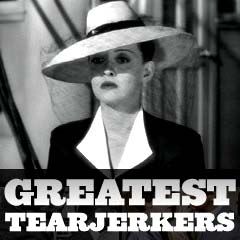|
The Greatest Tearjerkers of All-Time
|
|
Title Screen
|
Movie Title/Year and Brief Tearjerker Scene Description |
Screenshots
|
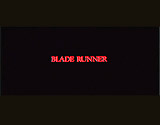
|
 Blade
Runner (1982) Blade
Runner (1982)
- bladerunner cop Rick Deckard's (Harrison Ford) cruel
undressing of Rachael's (Sean Young) humanity when she insisted
that she was human (by showing him a picture of her and her mother
and by describing her intimate, implanted memories first about
playing doctor with her brother and then seeing a spider egg hatching)
with his retort: ("Implants! Those aren't your memories. They're
somebody else's. They're Tyrell's niece's [memories]") - the
retraction of his comments came too late, as a tear flowed liberally
down Rachael's cheek -- followed by a long shot of her throwing
the photo to the floor and fleeing Deckard's apartment (later,
she would tearfully come to terms with her artificiality: "I'm
not in the business. I am the business")
- the famous scene in which replicant Roy Batty (Rutger
Hauer) gave a poignant, eloquent speech before dying, after he
had saved Deckard's life: ("I've seen things you people wouldn't
believe. Attack ships on fire off the shoulder of Orion. I watched
C-beams glitter in the dark near the Tanhauser gate. All those
moments will be lost in time like tears in rain. Time to die")
|


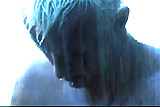
|
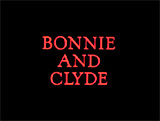
|
 Bonnie
and Clyde (1967) Bonnie
and Clyde (1967)
- in a shocking and tense
"ballet of blood" finale - an ultra-violent, country backroads
ambush was set for outlaw doomed lovers Bonnie Parker (Faye Dunaway)
and Clyde Barrow (Warren Beatty) - in their final freeze-frame of
life, with a silent glance at each other, Bonnie and Clyde revealed
both panic and love in their faces - knowing that something was ominously
wrong and that they were facing their ultimate destruction, the natural
result of the escalating violence
- their frenzied corpses writhed in slow-motion as
they were gunned down, 'shot,' and riddled with bullets - they
died cinematically-beautiful, abstracted deaths to accentuate the
romance of the myths and the larger-than-life legends that surrounded
them. Their last moment of 'life' occurred when Clyde rolled over
gently in slow-motion and Bonnie's arm dangled unnaturally and
then stopped moving. Bonnie's flowing blonde hair, streaked in
sunlight and gently blowing in the breeze, cascaded down in many
arcs as she hung out of the car
|


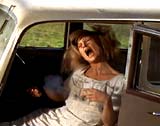
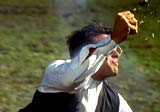
|

|
Born Free (1966, UK/US)
 #54 #54
- the scene in which adult lion Elsa, previously the
youngest of a trio of orphaned cubs, was released into the wild
to enjoy a free life after being tested to assure that she could
feed herself and survive during a three month period, after being
raised by two Kenyan game wardens George and Joy Adamson (husband
and wife Bill Travers and Virginia McKenna)
- the couple became
very worried when after releasing Elsa into the wild, she wasn't
able to easily assimilate into a pride of lions, and once returned
to them injured; Joy was concerned: ("All my nightmares had come
true"), and George argued she'd be safer in a zoo: ("It won't do.
Look, by now it's perfectly obvious she can't make it. She can't
fend for herself, she can't mix with her own Kind, she can't do
anything a wild lion must do to survive. We've - You've done too
good a job on her. We've made her tame, and it's too late to try
to let her go wild now. All we're doing is making her miserable,
torturing her. How can you be so cruel?"); although George thought
a zoo might be the best option, Joy was adamant that Elsa should
remain free and not live in a cage for the rest of her life: "She
was born free, and she has the right to live free. Why don't we
live in some nice comfortable city, George? Other people do. But
we've chosen to live out here because it represents freedom for
us. Because we can breathe....So could she be! She can"
- as a result of a further time extension to help
Elsa adapt, they took her to an area only 35 miles from where she
was born, and slowly, she began to leave the Adamsons
for days at a time and eventually made several kills to feed herself
- during her "most dangerous and final test," Joy
had to shoot a warning shot when a competing lioness fought against
Elsa, to scare away the other lioness; he assured Joy: ("She's
done it. She's crossed the bridge. She's wild now and free. You
should be very happy. And proud. We've... you've done something
no one else has ever done. And you should be very proud")
Joy was worried: "Suppose we never see her again?"
- when the Adamsons returned to Africa a year later,
they camped in the same spot but feared they would never find Elsa
again. At the end of their week's stay, they finally located and
saw Elsa who approached their campsite with three cubs of her own:
(Joy's voice-over) ("Elsa and her babies stayed with us all
the afternoon and she made it quite clear that she was happy to be
with us again. I was dying to pick them up and hold them, as I had
done with Elsa and her sisters. But I knew that it would be wrong.
They were wild and it was better now that they remained wild...We
saw her many times again, born free and living free. But to us she
was always the same: Our friend, Elsa.").
- the climactic ending
view of Elsa was set to the strains of the Oscar-winning title song
and score by John Barry
|
Reunited with Elsa (and Cubs) A Year Later
|

|
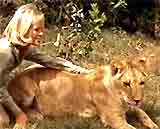
|

|
|



Joy: "Suppose we never see
her again?"
|

|
The Brave Little Toaster (1987)
- the surprisingly poignant scene in the animated
musical-comedy in which nature and technology met: the Toaster
(voice of Deanna Oliver), hiding from woodland animals, encountered
a yellow flower standing in a single ray of light. The flower saw
its own reflection in the Toaster's shiny metal chrome and thought
it had found a companion, but the Toaster backed away and dismissively
explained:
"Oh, no, no. It's just a reflection. It's not real." Undeterred,
the flower embraced the Toaster anyway. Panicked, the Toaster then
hid behind a bush, took a peek through the leaves and saw that the
flower, now wilted and dying, was bent over in sorrow, rejection
and loneliness - a petal dropped to the ground like a tear. The Toaster
walked away, looking back in guilt and with some pensiveness, learning
a lesson about cameraderie, as he would be more friendly and supportive
of his other appliance friends from now on (an antique radio, a gooseneck
lamp, an electric blanket, and a vacuum cleaner)
|


|

|
Braveheart (1995)
 #21 #21
- Scottish legendary kilt-clad, war-painted hero William
Wallace's (Mel Gibson) rousing, emotional speeches to his loyal
followers: ("I AM William Wallace! And I see a whole army
of my country men, here, in defiance of tyranny. You've come to
fight as free men, and free men you are. What will you do with
that freedom? Will you fight?...Aye, fight and you may die. Run,
and you'll live - at least awhile. And dying in your beds, many
years from now, would you be willing to trade ALL the days, from
this day to that, for one chance, just one chance, to come back
here and tell our enemies that they may take our lives, but they'll
never take OUR FREEDOM!")
- Wallace's heroic death scene as he courageously faced
torture: ("I'm not dead yet") and then was brutally beheaded
- when he saw the ghost of his dead wife Murron (Catherine McCormack)
in the crowd
|
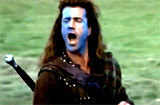
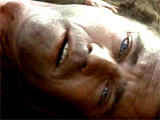
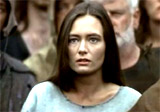
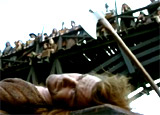
|
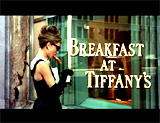
|
Breakfast at Tiffany's (1961)
 #47 #47
- the film's final scene in a cab during a downpour;
NY socialite Holly Golightly (Audrey Hepburn) stubbornly insisted
to neighbor writer Paul "Fred" Varjak (George Peppard)
that she would still be traveling to NYC's Idylwild Airport and
fly to Brazil (even though South American millionaire José da
Silva Pereira (Vilallonga)
had decided to break up with her through a letter delivered by
his cousin, to protect his reputation) - Paul read the letter outloud,
with its final line: ("I have
my family to protect and my name and I am a coward where these
institutions enter. Forget me, beautiful child. And may God be
with you. Jose")
- in a heartbreaking moment, Holly decided to abandon
her nameless Cat by letting it out the taxi's back door: "I'm
like cat, here. We're a couple of no-name slobs. We belong to nobody.
And nobody belongs to us. We don't even belong to each other. Stop
the cab. What do you think? This ought to be the right kind of
place for a tough guy like you. Garbage cans, rats galore. Scram!
I said take off! Beat it! Let's go!"
- the sequence of Paul's angry lecture at Holly after
ordering the cab to pull over and stop: "You know what's wrong
with you, Miss Whoever-you-are? You're chicken. You've got no guts.
You're afraid to stick out your chin and say, 'Okay, life's a fact.'
People do fall in love. People do belong to each other because
that's the only chance anybody's got for real happiness. You call
yourself a free spirit, a wild thing. And you're terrified somebody's
gonna stick you in a cage. Well, baby, you're already in that cage.
You built it yourself. And it's not bounded in the west by Tulip,
Texas or on the east by Somaliland. It's wherever you go. Because
no matter where you run, you just end up running into yourself" -
he tossed the engraved Cracker Jack ring at her ("Here. I've
been carrying this thing around for months. I don't want it any
more"), and left the cab to find Cat
- in the film's final moments, with a sudden change
of heart, Holly put on the ring, exited the cab and ran back down
the rain-soaked street, joyously located Cat, and was reunited
with both Cat and Paul in an alleyway - she kissed Paul with the
Cat squeezed in-between them - her last line: "Cat! Cat! Oh,
Cat... ohh..."
|

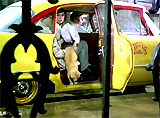



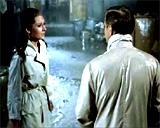
|

|
Breaking the Waves (1996, Den./Swed./Neth./Fr./Norway)
 #42 #42
- the melodramatic plotline was set in North Scotland
where paralyzed Danish oil-rig worker Jan Nyman (Stellan Skarsgaard)
(with a broken neck) insisted his new kind-hearted wife Bess (Emily
Watson) sleep with other men as a way to establish spiritual contact
with him: (Bess: "I don't make love with them. I make love
with Jan. And I save him from dying")
- the scene of Bess' tragic rape/murder in a sacrificial
martyr's death aboard a ship where even prostitutes wouldn't go
- during Bess' burial, the discovery that there was
only sand in the coffin - Bess was refused a proper burial as a transgressive
cast-out from the community, so a miraculously-healed Jan stole her
body in order to bury her at sea
- the on-deck scene just before Bess' burial when Jan
kissed her face before she was tossed into the ocean
- Jan listened joyfully as two heavenly bells mercifully
rang over the oil rig in the film's cosmic ending - a view through
the clouds of the tiny oil rig was accompanied by two gigantic, pealing
church bells
|




|

|
Brian's Song (1971) (TV)
 #7 #7
- running tailback Gale Sayer's
(Billy Dee Williams) haltingly-spoken locker room address to his
fellow Chicago Bears players on Brian Piccolo's (James Caan) terminal
testicular cancer, and his break down into uncontrollable sobs
to prematurely end his speech: ("Uh, you uh, all know that
we hand out a game ball to the outstanding player...Well, I'd like
to change that. We just got word that Brian Piccolo is...that's
he's sick, very sick...And, uh, it looks, uh...like he might never
play football...again, or, uh, a long time...And, I think we should
dedicate ourselves to give our maximum effort to win this game
and give the game ball...to 'Pic'. We can all sign it. And take
it up...Aw, sh....Oh, my God...")
- and later, Sayer's tear-jerking acceptance of the
George S. Halas Award for Courage that he dedicated to Brian, who
died at age 26: ("I love Brian Piccolo. And I'd like all of
you to love him too. And tonight, (when) you hit your knees - please
ask God to love him.")
|
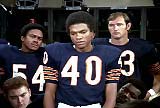

|

|
The Bridges of Madison County
(1995)
- the lingering glance between married Iowa farmwife
Francesca Johnson (Meryl Streep), seated in her husband's truck,
and National Geographic photographer Robert Kincaid (Clint
Eastwood) following their four-day love affair, as he stood in
the street a short distance away on a rainy afternoon (Francesca
in voice-over: "For a moment, I didn't know where I was.
And for a split second, the thought crossed my mind that he really
didn't want me. That it was easy to walk away")
- at a red stoplight behind Robert's truck (from Washington
State), she noticed that Robert leaned over in his truck's cab
and retrieved something from his glove-box (she remembered, in
voice-over: "8 days ago, he'd done that, and his arm had brushed
across my leg. A week ago I'd been in Des Moines, buying a new
dress")
- Francesca's heartbreaking, pivotal, and fateful,
cross-roads decision to remain with her husband in their truck
instead of jumping out (although she partially turned the truck's
doorknob), and her thoughts after watching Robert's truck turn
left and drive away forever: ("Oh, no. The words were inside
of me. I was wrong, Robert, I was wrong to stay, but I can't go.
Let me tell you again why I can't go. Tell me again why I should
go. I heard his voice coming back to me: 'This kind of certainty
comes but once in a lifetime.'")
- the scene of Francesca's later receipt of a package
from Robert's lawyer on his death featuring mementos of their affair
|


|
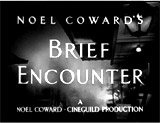
|
Brief Encounter
(1945/1946, UK)
 #12 #12
 #18 #18
- the many emotionally potent scenes between middle-class
housewife Laura (Celia Johnson) and doctor Alec (Trevor Howard)
in their weekly clandestine meetings, including the famous scene
of their final day together when they were interrupted by a friend
during their last, painful, repressed goodbye (both at the start
and end of the film) as Alec gently placed his hand on her shoulder
and then disappeared forever (on a medical journey to Africa)
|

|
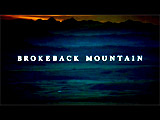
|
Brokeback Mountain (2005)
- the scene in which bisexual
cowboy Ennis del Mar (Heath Ledger) and lover Jack Twist (Jake
Gyllenhaal) painfully tried to deal with their mutual sexual and
romantic attraction and Jack's painful admission:
("The truth is... sometimes I miss you so much I can hardly
stand it...") as they dealt with the secretiveness of their
affair, and the pained partings after each tryst
- the tearful scenes in which their wives learned
of their affair: ("You don't go up there to fish")
- the final break-up between
the two when Jack delivered an ultimatum, expressing his pain when
they were apart: ("Tell
ya what. We coulda had a good life together! F--kin' real good
life! Had us a place of our own. But you didn't want it, Ennis!
So what we got now is Brokeback Mountain! Everything's built on
that! That's ALL we got, boy! F--kin' ALL! So, I hope you know
that. If you don't never know the rest! You count
the damn few times that we have been together in nearly 20 years,
and you measure the short f--kin' leash you keep me on, then, you
ask me 'bout Mexico! And you tell me you'll KILL me for needin'
somethin' that I don't hardly NEVER get! YOU HAVE NO IDEA HOW BAD
IT GETS! And I'm not you, I can't make it on a couple of high-altitude
f--ks once or twice a year! YOU ARE TOO MUCH FOR ME, ENNIS! You
son of a whoreson bitch! I wish I knew how to quit you!")
and Ennis' sobbed response: ("Well, why don't you? Why don't
you just let me be, huh? It's because of you, Jack, that I'm like
this! I ain't got nothing, and I'm, I'm nowhere... Get the f--k
off me!...Sorry I can't stand much anymore, Jack")
- the scene of Ennis visiting Jack's parents some
time after his death, and his first discovery of the blood-stained
shirts in Jack's childhood bedroom closet. The shirts belonged
to himself and ex-lover Jack from when they fought together years
earlier on Brokeback Mountain (Jack had died while changing a tire
that exploded, although Ennis imagined it as a gay-bashing incident
in a field) - Ennis held the shirts to his face and breathed in
their scent
- the melodramatic ending,
in which Ennis once again saw their two old shirts (hanging in
the back of a closet in the trailer of his father). The two shirts
were both together on one hanger, intertwined - Jack's blood-stained
shirt was tucked inside of Ennis's - he also saw a postcard of
Brokeback Mountain tacked next to the shirts and straightened it
- he tearfully and regretfully cried about their forbidden homosexual
love affair: ("Jack, I swear...")
|

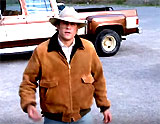


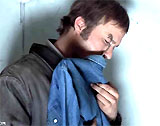
|
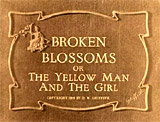
|
Broken
Blossoms (1919)
- the tragic life of the sensitive and frail teenage
Cockney waif Lucy Burrows (Lillian Gish), and the scenes of her
forced smile by pushing up the ends of her mouth with her fingers
- the unforgettable death scene as her brutal and
bigoted father Battling Burrows (Donald Crisp) savagely broke down
a closet door as she cowered there and twisted to avoid him, but
later received the fatal blows in the bedroom
- Lucy succumbed on her pillow while clutching her
doll (her link to the Yellow Man) and gave a final finger-smile
(her link to her father): (title-card) "Dying, she gives her
last little smile to the world that has been so unkind"
|
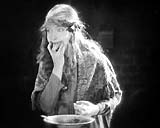


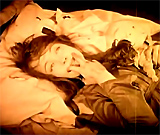
|
